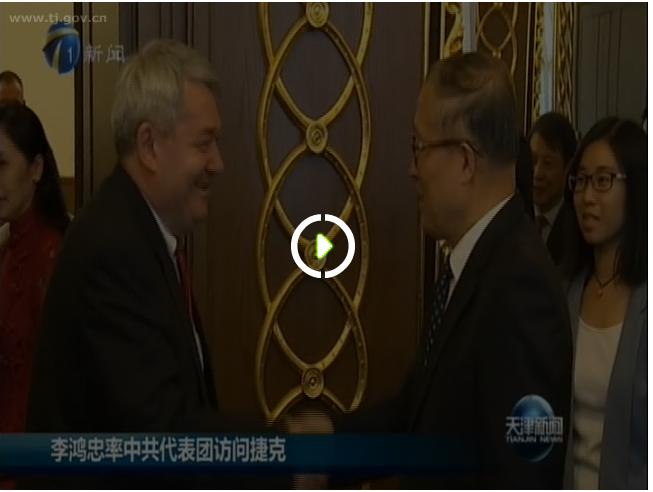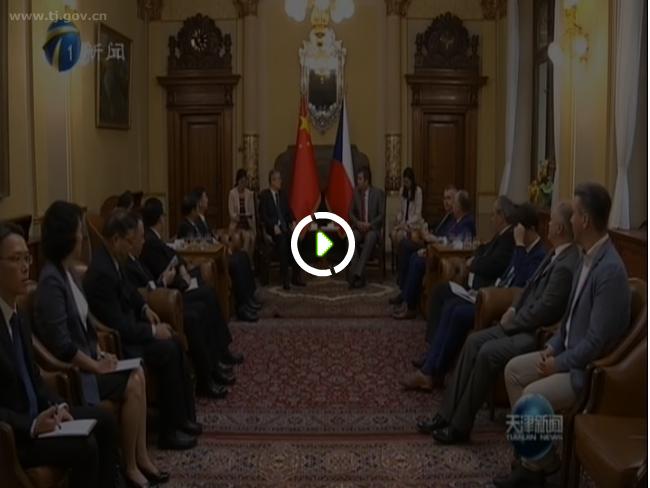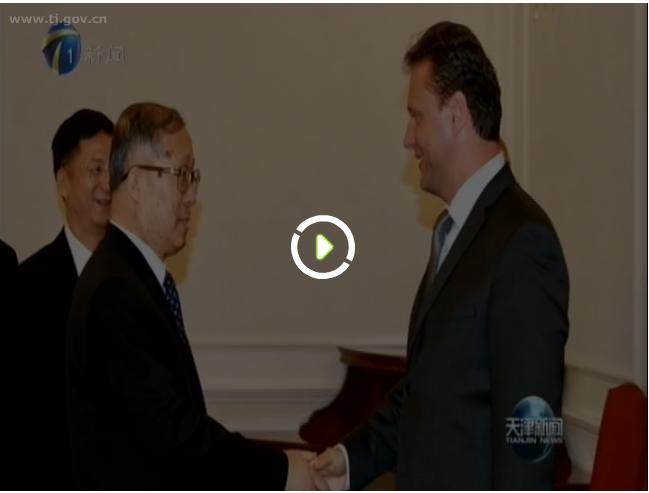A “regional” visit from Tianjin
Between July 8 and 11, a delegation led by the Tianjin Party secretary visited Prague. According to the People’s Daily, the Chinese Communists were “invited over by the Czech Social Democratic Party (ČSSD)”. Municipal Party secretary Li Hongzhong 李鸿忠 met with the vicepremier and minister of the interior, Jan Hamáček (ČSSD), the speaker of the Chamber of Deputies, Radek Vondráček (ANO, senior partner in the ruling coalition), and the chairman of the Czech Communist Party (KSČM), Vojtěch Filip. Secretary Li, once a People’s Militia company commander in Shenyang, has had a long career as a Party apparatchik and is now a member of the CCP politburo. The visit, unreported to the Czech public before Sinopsis’ work with local media, illustrates an emerging tradition of relations with China: meetings are kept secret, China lobbyists mediate contacts, and business interests are often involved. The latter is particularly relevant to this case: Tianjin politics is central to the post-2014 era of Czech “economic diplomacy”, linked to the Tianjin business interests of PPF, the largest Czech corporation.
Secretive Secretaries
The meetings with Hamáček and Filip were attended by the noted China lobbyists Jaroslav Tvrdík (ex-minister of the interior for ČSSD, famous for his destructive managerial skills and his work for PPF, then CEFC and now CITIC) and Jan Birke (ČSSD MP) and the Chinese ambassador to Czech Republic Zhang Jianmin 张建敏. Searches in Czech media outlets, social media, official government and party websites showed no mention of the meetings. The only Czech-language report seemed to be the one released by China Radio International prior to collaborative reporting by Sinopsis and TV Seznam, based on Chinese sources, a week after the end of the visit.

Vicepremier Hamáček has yet to respond to journalists’ questions on his secretive meeting with the CCP delegation. This is actually his second meeting with a CCP high-profile Party delegation in two months. In late May, he met with Zhejiang province Party secretary Che Jun 车俊. Similarly, the meeting was not reported until a report by Czech investigative website Hlídací pes and Sinopsis, using Chinese language sources. Before his transfer to Zhejiang, Che was among the CCP’s top cadre in Xinjiang, a region best known to international audiences for the plight of the local ethnic minorities. Before becoming vice Party secretary of Xinjiang, he held the top Party role at the Xinjiang Production and Construction Corps (新疆生产建设兵团, often known by its shortened name, Bingtuan 兵团) for five years. The Bingtuan is a paramilitary economic organization, overwhelmingly staffed by Han Chinese, that allows the central government to directly control key strategic patches of land in the Uyghur autonomous region.

Stability is our goal
In contrast with Hamáček’s reticence, Vondráček seemed happy to share his impressions about the meeting with Li. He told TV Seznam that he had indeed met with the Chinese delegation (despite an earlier statement about plans for a two-week holiday). Vondráček proclaimed that he had met with a “Politburo member, Parliament member, but above all representative of the region [Tianjin].” The statement might reflect a lack of understanding of China’s political system: Li’s position as member of the Politburo and Party secretary of one of the province-level cities outrank his appointment as delegate to the National People’s Congress (全国人民代表大会), which is hardly a “parliament” in the European understanding of the term. Vondráček’s recollection continued:
They mentioned their goals: that their goal is for China to be a prosperous, stable and democratic country. I mentioned that we have the same goal in the Czech Republic, and part of the meeting was about the fact that our common goal is that we do not want additional tariffs, duties, protectionism, and that what is now going in the world is basically not in the interest of the Czech Republic.

Tianjin and PPF
Coinciding with the Czech high-profile political meetings, a Tianjin City Government delegation met with the president of Home Credit China, Lumír Meloun, in Prague. Home Credit is a non-bank commercial loans provider. The company is a subsidiary of PPF, a large Netherlands-registered corporation 99%-owned by the richest Czech citizen, Petr Kellner. The company was established and helped Kellner make his fortune during the post-Communist privatization process. The Tianjin-PPF meeting was also attended by Roman Prymula, deputy minister of health, and Libor Seneta, of the center-right party TOP09, director of Emergency Medical Services of Hradec Králové Region. The region’s health sector’s interaction with China is not new: a local university hospital hosted a Chinese medicine center until the hospital authorities had to close it last February, in reaction to legislative changes. At the July 9 meeting, the PPF subsidiary signed a memorandum to donate ambulances to the Tianjin Medical Emergency Services Center.
Tianjin is extremely important for PPF. This is where the company started experimenting with its Chinese Home Credit subsidiary. It was the success of this project that convinced the financial group to further deepen cooperation, but such level of cooperation required political backing and guarantees from the “home country”. PPF started hiring former and active Czech politicians, such as Jaroslav Tvrdík, to lobby for a change in the country’s China policy: from one stressing human rights to one completely ignoring them in exchange for the promise of economic benefits (“economic diplomacy”). In 2014, when these activities finally bore fruit and the Czech China policy took a 180° turn, Home Credit obtained a license to operate on the national level in China.
During these critical years, the Party secretary of Tianjin, where Home Credit China still has its headquarters, was current PRC Vice Premier Sun Chunlan 孙春兰, also a Politburo member since 2012. In 2014, she was promoted from the highest Tianjin position to lead the United Front Work Department (UFWD), an organ under the Central Committee that coordinates a system of organizations coopting extra-Party forces at home and abroad. Sun’s connection to the Czech Republic has continued long after leaving Tianjin: she visited Prague late last year and attended the opening of the Czech capital’s first Confucius Institute.
Discreetly P2B: The public need not be informed
The lack of any Czech announcement of the CCP visits, consistent with an attempt to conceal these engagements from the public, suggests that Czech politicians have become aware of the toxicity of meeting with Chinese Communist officials, or perhaps simply accept the visitors’ penchant for discreetness. Such secretiveness is hardly new. Hamáček’s participation in a “Meeting of Political Parties from China and CEE” in Bucharest in 2017, organized by the CCP’s International Liaison Department, was likewise unreported in the Czech Republic until disclosed by Sinopsis. Similarly, the rather consequential establishment of a “Czech-Chinese Center” at the Czech Ministry of Industry and Trade only became known to local media and the public only after Sinopsis exposed it.
In contrast to the empty meetings with Czech state and party representatives, the meeting with PPF and emergency services looks way more productive. In this context, it almost seems as if the Chinese delegation agenda was a continuation of the dialogue between PPF and Tianjin party bodies, rather than a state visit.
Czech version:
“Čínští tajemníci a čeští byznysmeni”, Sinopsis, July 17;
“Když se Peking zrovna nezlobí. Čínští komunisti, čeští politici a byznysmeni si rozumějí”, Hlídací pes, July 19.
